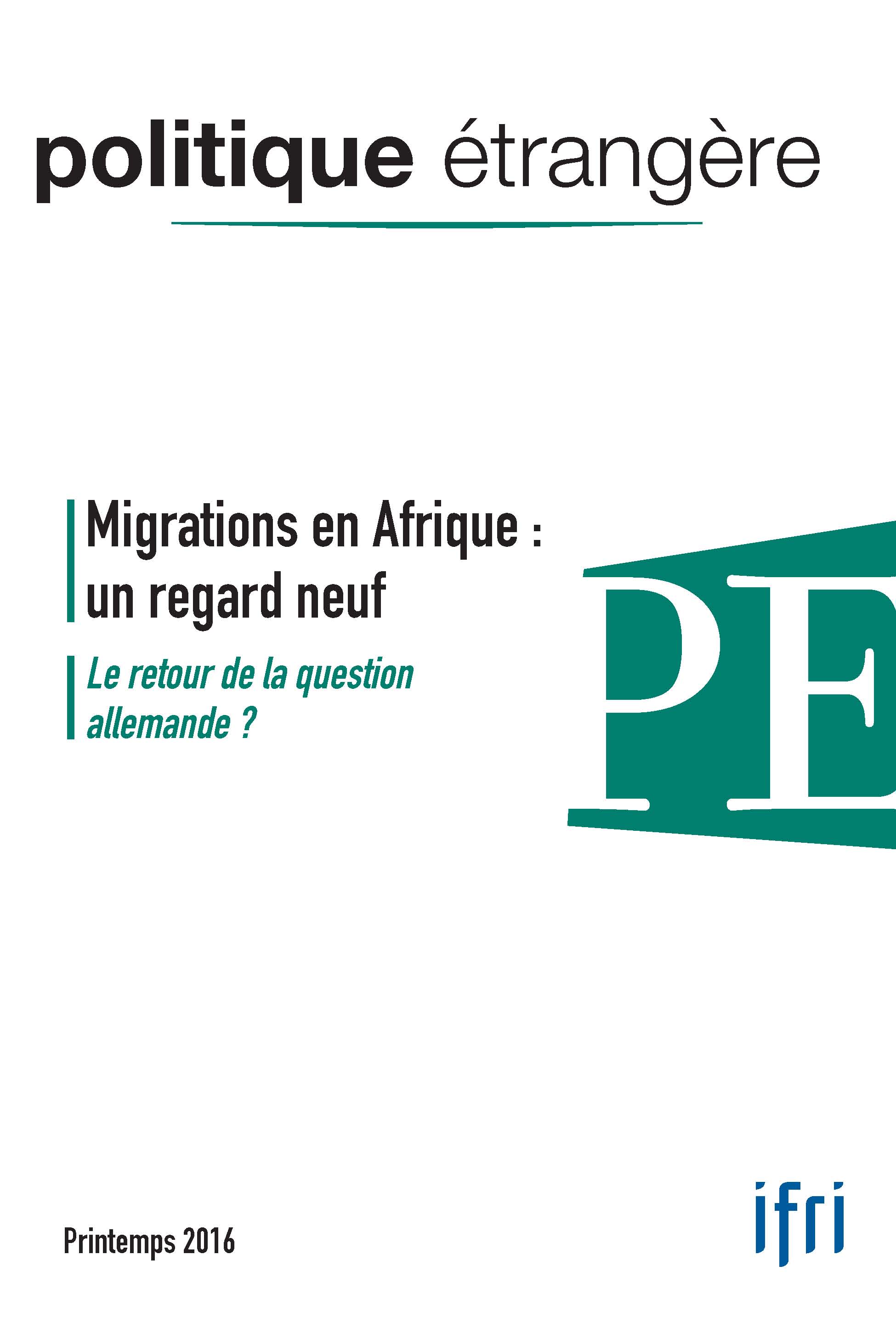Political Systems
At the end of the Cold War, the idea spread that liberal democracy was going to take over the world. In reality, authoritarian regimes have resisted, and political systems remain varied.


Migrations in Africa: Another Look
Migration in Africa is a major concern, but largely for Africans alone. To adequately study the question of international migration, one must look beyond Europe’s current predicament. Through its dossier on “Migrations in Africa: Another Look”, this issue of Politique étrangère examines a number of factors that determine migration movements, how states in Africa attempt to manage the significant problem of internal migration, the difficulties of integrating migrant workers into their host societies, and the false pretenses of Euro-African agreements on readmission.

Understanding African Migrations
Movements of African people, being within their countries, on the continent or heading Europe, have numerous and ancient causes. The term “migration” covers a plurality of situations with many internal as well as international implications. Therefore, reasons to migrate deserve a careful analysis. One cannot tackle such a phenomenon through mere border control policies or their externalization, as the European Union seems inclined to do.
Russia’s Immigration Policy: New Challenges and Tools
A new stage in the development of Russia's migration policy is upon us. Since 2010, legal amendments and the Concept of Migration Policy of the Russian Federation to 2025, adopted in June 2012, marked a clear change in how migration flows are regulated, the aim being now to maximise the economic benefit of labour migration.
“Conservatism” in Russia: Political Tool or Historical Choice?
President Vladimir Putin’s third term of office proceeds under the “conservative shift.” Does this mean that the Russian government has finally opted for conservatism as its official—though not state—ideology, with long-term consequences for both its domestic policy and foreign policies?
Nigeria: From Goodluck Jonathan to Muhammadu Buhari
Nigeria has experienced a political changeover due to the presidential and parliamentary elections on 28 March 2015, enabling Muhammadu Buhari – a retired general who was in power between 1983 and 1985 – to return to office. The deadline of 2015 represented for him a fourth attempt after his consecutive failures in the 2003, 2007 and 2011 presidential elections.
The BJP and State Politics in India: A Crashing Wave? Analyzing the BJP Performance in Five State Elections
In May 2014, the Bharatiya Janata Party (BJP), led by Narendra Modi, decisively won India’s sixteenth General Elections. For the first time in thirty years, a party secured a single majority of seats in the lower house of parliament – the Lok Sabha (282 out of 543) – and for the first time since independence, that party wasn’t the Congress.

The German Debate on Country’s Security: Different Discourse, Same Paradigm
Recent debates in Germany about the future of the country’s security and foreign policy have aroused interest abroad, especially in France.

International Criminal Justice at 70: Between the Iron and Golden Ages
The modern principle of international criminal justice goes back to Nuremberg and its highly specific historical context. The 1990s marks a decade of renaissance, for former Yugoslavia and Rwanda in particular.
Refugees and European borders in the aftermath of Paris’ terror attacks
Just a day after the murderous attacks that killed 129 people and wounded about 350 more in Paris and St Denis on November 13th 2015, the word spread that a Syrian passport had been found near the body of one of the Stade de France’s attacker.
Russia: Business and State
Business in Russia today is closely intertwined with the political sphere. But the forms of business’s involvement in politics have differed radically at different stages in history. Initially, business played an active role, displacing the government from its position due to its vigorous expansion. Subsequently, the state began to regroup, reinforcing its positions not just in politics but in the market too. Despite increased economic uncertainty and enormous changes in Russia’s foreign policy positions, the government currently remains the central actor in both Russian politics and the economy.
Support independent French research
Ifri, a foundation recognized as being of public utility, relies largely on private donors – companies and individuals – to guarantee its sustainability and intellectual independence. Through their funding, donors help maintain the Institute's position among the world's leading think tanks. By benefiting from an internationally recognized network and expertise, donors refine their understanding of geopolitical risk and its consequences on global politics and the economy. In 2024, Ifri will support more than 70 French and foreign companies and organizations.
















